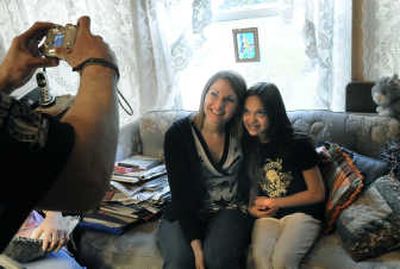Matching pairs

Darlene Cate has raised her great-grandchildren in a loving Spokane Valley household, but there’s only so much the 71-year-old who walks with a cane can do for rambunctious 11-year-old Ashley and her 9-year-old brother, Nathan.
That’s why the children enrolled recently in the Big Brothers and Big Sisters program. The children’s new mentors, Stephen Holcomb, 27, and his wife, Cyndi, 24, of Liberty Lake, were just as excited as the kids during their first meeting. Within the hour, all four of them were bouncing on the children’s backyard trampoline and planning a trip to the mall for Cinnabons.
“We’re buying season passes for Silverwood (Theme Park). The kids don’t know yet, shhhhh,” Stephen Holcomb said in a whisper. “There’s 5 million things I can do with this guy. This is going to take me back to my childhood.”
In many ways, this was a typical matching between mentors and mentees – something done every day, across the country, through organizations like Big Brothers and Big Sisters of the Inland Northwest. But it takes on added significance in that it’s one of the first matches under a new statewide study that could have national implications.
Issaquah-based Washington State Mentors is spending $3.5 million, most of it donated by the Bill and Melinda Gates Foundation, for the Mentoring At-Risk Youth Project, a five-year study that will serve up to 3,300 youth statewide. Individual agencies like Big Brothers and Big Sisters will create mentoring matches between adults and children, then survey the children, parents and mentors before and after the matches are created to gather data.
Gonzaga University’s Center for Community Action and Service Learning is also participating in the study. The Big Brothers chapter received $457,600 for the life of the grant, with which it hopes to create 144 matches. Gonzaga received $202,000, which should help the center create up to 55 matches.
The question being asked is: Can children with multiple challenges in their lives – perhaps an incarcerated or drug-addicted parent, gang activity in their neighborhood and a history of being bullied – benefit from mentoring relationships? Can they become more engaged at school, improve relationships with their families and heighten self-esteem? The study has national potential to influence thought about whether mentoring can turn around the lives of “high-risk” children, meaning those struggling with numerous obstacles to their well-being, said Janet Heubach, grants officer for Washington State Mentors, an umbrella organization for mentoring efforts in the state.
“That has policy implications, it has grant-funding implications,” Heubach said. “People will be watching it carefully.”
Darlene Cate has had full custody of her great-grandchildren since they were infants. The children’s mother lives in Spokane, but the Cates do not know the identities of the children’s fathers. Darlene Cate said she’s limited physically in providing everything she wants the children to have, like active outings and relationships with other caring adults.
“I was just so happy when I heard there was a married couple interested in both,” Darlene Cate said. “I want to see them know that people care. I want them to be happy.”
A University of Massachusetts-Boston professor who has studied mentoring for more than 20 years said this study will be the first to focus the spotlight on “high-risk” youth.
“It has the potential to be quite significant in the sense that it will tell us whether this intervention approach works,” said Dr. Jean Rhodes, who also serves on the board of the National Mentoring Partnership. “There is a question about whether high-risk kids can benefit from mentoring because it is a relatively low-intensity intervention.”
The question, she said, is whether those children should instead be referred directly to more intense treatments, such as psychotherapy. However, Rhodes said when she began studying mentoring in the midst of a crack epidemic in Chicago, she found some children thriving and looked at what made them resilient.
“One good relationship was what made a difference,” she said. “If you can do mentoring right, you can take psychology away and release volunteer paraprofessionals out into the community.”
Data will be gathered for the study as children, parents and mentors fill out surveys, answering questions about factors in the child’s life, including school, friends, family and self-esteem. After a year, they will complete the same surveys.
“This grant has allowed us to expand to Longfellow (Elementary School),” said Sima Thorpe, director of Gonzaga’s Center for Community Action and Service Learning, in which college students mentor elementary school students. Due to the program’s popularity, the center already has formed 20 matches under the new grant. The center also reaches children at Logan, Stevens, Garfield and Bemiss.
Thorpe said she hopes the study will provide exposure that will allow Gonzaga’s program to be replicated at other universities.
“We can’t believe how big this is going to be,” Thorpe said. “We’re so proud of our program and our students who give amazing amounts of time. They’re not getting credit for this or anything. They’re doing this because they care.”